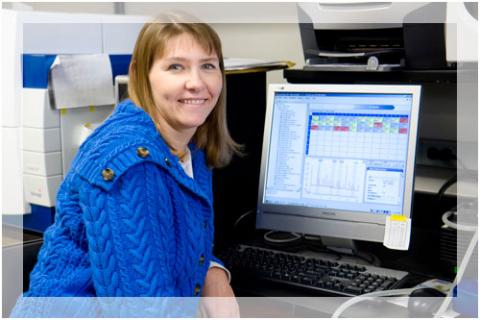Clinical Pharmacogenomics Laboratory
 Pharmacogenetics is the study of how genetic regulated variation may impact ones’ ability to respond to or develop side effects from medications. Simply put, pharmacogenetics lies at the intersection of pharmacology, clinical pharmacy, and genetics. Genetic differences in how a person might metabolize (or break down) a certain medication or how genetic differences in the shape or function of a drug receptor may affect outcome, lies at the heart of pharmacogenetic research.
Pharmacogenetics is the study of how genetic regulated variation may impact ones’ ability to respond to or develop side effects from medications. Simply put, pharmacogenetics lies at the intersection of pharmacology, clinical pharmacy, and genetics. Genetic differences in how a person might metabolize (or break down) a certain medication or how genetic differences in the shape or function of a drug receptor may affect outcome, lies at the heart of pharmacogenetic research.
It is well known that people often respond differently to the same relative dose of the same medication. Such variable responsiveness can be manifest clinically either as a difference in desired effectiveness (either increase or decrease) or as the occurrence of toxicity. Depending on the condition being treated, only 25-80% of individuals are expected to experience a "normal" degree of medication effectiveness.1 Similarly, data from 1994 showed an incidence of more than two million adverse drug reactions per year.2
While many factors can certainly contribute to variability in drug response, it is becoming increasingly clear that genes play a major role. Although individuals are more than 99.9% genetically identical, that still leaves well over one million locations in the genome where two people can differ from one another.3 Such genetic differences can influence nearly every step from drug administration to drug response to drug elimination. For example, it has been suggested that all or nearly all drug-metabolizing enzymes have genetic variants4, and heritability studies of many of the most important drug metabolizing enzymes have estimated that 75-95% of the variability in enzyme activity is under genetic control in healthy individuals5 Supporting the clinical importance of such genetic variability in drug metabolism, a review of adverse drug reaction studies found that nearly 60% of drugs commonly cited in such studies were subject to genetically-variable metabolism as compared to only 7-22% of all drugs available in the U.S.6
Precisely how genetic factors influence drug response is known as pharmacogenomics, and despite the considerable advances that have already been made in genomics research, relatively little remains known regarding the clinical application of such pharmacogenomics knowledge. It is expected, however, that the clinical application of pharmacogenomics will dramatically increase over the coming years. For example, a recent FDA Guidance for Industry has encouraged the submission of pharmacogenomic data with new drug applications, likely increasing the demand for both more efficient genotyping/phenotyping technologies and for clinical study sites with the technology, expertise, and experience to carry out such studies.7 Similarly, although molecular diagnostics (such as pharmacogenomic tests) currently comprise only 4% of the in vitro diagnostic (IVD) market, it is expected to reach $4.2 billion by 2006, and it is predicted that by 2010, one-half of all prescribed therapeutics will have corresponding diagnostic test.8
Despite the obvious importance and increasing clinical relevance of pharmacogenomics, some important barriers to improving the clinical utility of such knowledge exist. These include the highly complex nature of the problem, little incentive for industry to move to genomic-based approach, and lack of provider education.9 The University of Michigan College of Pharmacy's Clinical Pharmacogenomics Laboratory (CPL) was started in January 2004 to encourage and support studies into the clinical application of pharmacogenomics, and the CPL is particularly well-positioned to overcome these barriers in its work to bring pharmacogenomics to the clinical setting. Research involving investigators with both clinical practice and pharmacology/ pharmacokinetics expertise is more likely to ask the appropriate questions and account for important confounders, while at the same time keeping the overall goal of clinical application/utility in focus. Further, there is considerable incentive for this group of clinician-researchers to bring these scientific advances to the patient bedside, and with a background in both the science and clinic applicability of pharmacogenomics, the CPL is in an optimal position to educate providers regarding this field and its utility.
- Spear BB, et al. Clinical application of pharmacogenetics. Trends Mol Med 2001;7:201-4.
- Lazarou J, et al. Incidence of adverse drug reactions in hospitalized patients. JAMA 1998;279:1200-5.
- Sachidanandam R, et al. A map of human genome sequence variation containing 1.42 million single nucleotide polymorphisms. Nature 2001;409:928-33.
- Evans WE. Pharmacogenomics: marshalling the human genome to individualise drug therapy. Gut 2003:52 (Suppl II):ii10-ii18.
- Ozdemir V, et al. Evaluation of the genetic component of variability in CYP3A4 activity: a repeated drug administration method. Pharmacogenetics 2000;10:373-88.
- Phillips KA, et al. Potential role of pharmacogenomics in reducing adverse drug reactions: a systematic review. JAMA 2001:286:2270-9.
- Guidance for Industry: Pharmacogenomic Data Submissions. November 2003. (view)
- Watson K & Williamson J. Genetic analysis and future pharmacogenomic applications. IVD Technology 2002. (view)



